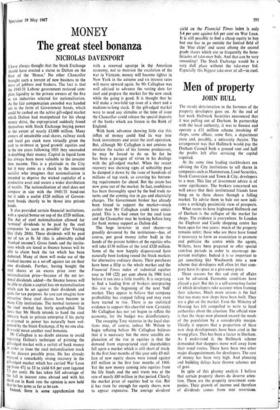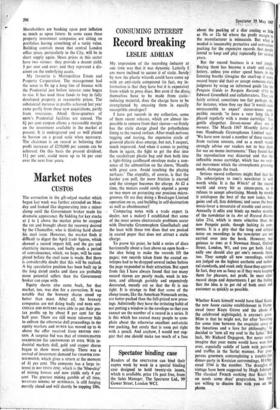Men of property
JOAN BULL
The steady deterioration in the fortunes of the property developers goes on. At the end of last week Hallmark Securities announced that it was pulling out of Durham. In partnership with the local authority, it was to finance and
operate a £11 million scheme involving 47 shops, some offices, some flats, a department store and, possibly, a university theatre. The arrangement was that Hallmark would pay the Durham Council both a ground rent and half the profits left after servicing the capital required.
At the same time leading stockbrokers are advising the City institutions to sell shares in companies such as Hammerson, Land Securities, Stock Conversion and Town & City, developers to a man. This line of investment advice is of some significance. The brokers concerned are well aware that their institutional friends have hung on to these shares through a falling market. To advise them to bale out now indi- • cates a strikingly pessimistic view of prospects.
What seems to have frightened Hallmark out of Durham is the collapse of the market for shops. The evidence is everywhere. In London the Elephant and Castle shopping centre has been open for two years: much of the property remains unlet; those who are there have found it necessary to form an association to promote and publicise the centre while the agents, Willetts, have been prepared to offer special rent-free periods in order to encourage im- portant multiples. Indeed it is so important to get something like Woolworth into a new scheme that developers will often let that com- pany have its space at a give-away price.
Three reasons for this sad state of affairs can be advanced. Economic conditions have played a part. But this is a self-correcting factor of which developers take account when framing their schemes. Much more serious is the fact that too many new shops have been built. They are a glut on the market. Even the Ministry of Dousing has felt compelled to write to local authorities about the situation. The official view is that the shops now planned exceed the needs of the population by a considerable margin. Thirdly it appears that a proportion of these new shop developments have been sited in the wrong place. This has been a factor in Durham. As I understand it, the Hallmark scheme demanded that shoppers move well away from their usual routes. There have been two other major disappointments for developers. The cost of money has been very high. And planning and building delays have thrown schemes out of gear.
In spite of this gloomy analysis I believe that certain property shares do deserve atten- tion. These are the property investment com- panies. Their growth of income and therefore of dividends comes from rent reversions: Shareholders are banking upon past inflation as much as upon future. In some cases these property investment companies are sitting on portfolios having something of a rarity value. Building controls mean that central London office space, particularly in the City, will be in short supply again. Share prices in this sector have two virtues: they provide a decent yield, 5 per cent and over; and they represent a dis- count on the underlying assets.
My favourite is Metropolitan Estate and Property Corporation. The management had the sense to fix up a long line of finance with the Prudential just before interest rates began to rise. It has used these funds to buy in fully developed property at reasonable prices. The substantial increase in profits achieved last year came partly from these new acquisitions, partly from reversions. Aboth three-quarters of mE.Pc's Prudential facilities are unused. The 61 per cent coupon allows a reasonable margin on the investment available in the market at present. It is undergeared and so well placed to borrow on a grand scale when necessary. The chairman is on record as believing that profit increases of £250,000 per annum can be achieved. On this basis the present dividend, 113 per cent, could move up to 16 per cent over the next four years.



































 Previous page
Previous page